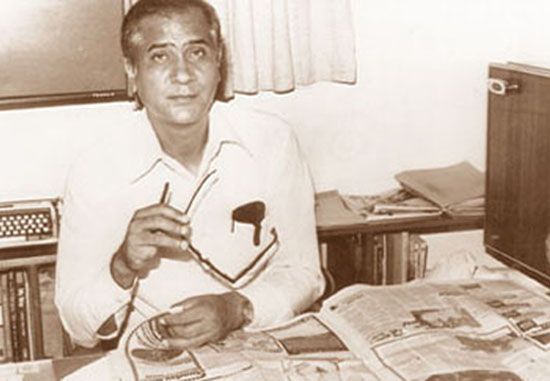OPINION: Vijendra Kumar – a long-serving editor of The Fiji Times who left the country 21 years ago disillusioned with its direction – has surged back into the public eye with an optimistic piece on Fiji’s future. It is noteworthy that the article doesn’t appear in the Times – Fiji’s oldest newspaper - but in its rival, the Fiji Sun, where my Grubsheet is also a columnist.
This is bound to raise eyebrows in media circles. When Kumar was inducted into the Fiji Media Council’s FAME Awards Hall of Fame four years ago, the then Fiji Times publisher, Rex Gardner, spoke of the “reverence” in which he was held at the paper. Yet his sober endorsement of the course that Frank Bainimarama has set for Fiji now sits much more comfortably in the opinion pages of the Fiji Sun, which broadly supports the government’s reform agenda.
The Times, by contrast, has long been the "Eeyore" of the Fiji media. Like the famous donkey in AA Milne’s Winnie the Pooh, it seems chronically unable to see a silver lining in any cloud, let alone a brighter horizon. It seems locked in a mindset that whatever the failings of the Qarase government, the 2006 coup was “illegal” and turning back the clock is the only proper attitude for any right-thinking Fijian to take.
That stance may be understandable when one proprietor – Rupert Murdoch – is forced out of Fiji and his successor – “Mac” Patel – serves time in jail for corruption. Yet when a “revered” former editor expresses an opposing view – and argues it so cogently – let’s hope that every Fiji Times journalist sets aside time to read it.
Regime media criticism
We’re not from the thought police – as our critics will undoubtedly allege – but there’s a balance here that properly reflects the government’s achievements as well as its failings. Kumar is especially critical about the regime’s handling of the media and Grubsheet endorses that view.
Once Fiji’s indispensable journal of record – and with a proud history stretching back to 1869 – The Fiji Times today is a sorry shadow of its former self under Kumar, who held the position of editor from 1975 to 1991 – a period spanning the Mara years and the seismic shock of the 1987 coups. The Fiji Times now would be unrecognisable to him.
Tentative, uncertain and scared, it certainly no longer sets the media agenda in Fiji.
When Vijendra Kumar left for Brisbane in 1991 to work for the Courier Mail, he wrote a memoir that he titled Goodbye to Paradise in which he said:
“I left Fiji in 1991, sad and disillusioned. Sad, because the country of my birth, where our ancestors’ bones lie interred, no longer made me feel welcome. Disillusioned because a nation once internationally hailed as a peaceful paradise and a showcase for democracy and multiracial harmony turned out, in the end, to be a purgatory for half its people. For beneath the thin veneer of a civilised and enlightened society lurked serious undercurrents of racial tension and hostility.
“Since arriving in Australia I have returned to Fiji only once, in 1995. This visit reinforced my belief that Fiji Indians face a bleak future in their own country, feeling marginalized and alienated, uprooted and unwanted…the country has since been on a mad roller-coaster ride and no one knows where or how it will end.”
As Vijendra Kumar makes clear in the article below, we still don’t know precisely how it will all end . But Frank Bainimarama’s policies of inclusion have at least stopped that process of alienation which drove Kumar and so many others from the country in the first place.
Certainly for all the government’s failings, the future looks a lot brighter for many people than it did. It’s a work in progress, rather than a final destination.
But now that democracy is in the process of being restored, there are definite grounds for optimism.
When he left in 1991, Fiji lost one of its shining journalistic lights. We’re reprinting his article in full – a break with tradition for Grubsheet – because we believe this is classic Kumar; well written, rapier sharp and with an overall analysis that entirely hits the mark.
Let’s hope that the coming years produce a sequel to his memoir that he might call – Hello to Paradise Again.
ON THE ROAD TO RADICAL REFORM
How Commodore Bainimarama could be Rawlings of the islandsBy VIJENDRA KUMAR
As the Fiji Government prepares to draft and adopt a new Constitution and return the country to democratic rule, it might be useful to take a leaf out of the history of the West African state of Ghana. It is today one of the few stable and prosperous democracies on the African continent, thanks largely to an air force officer named Jerry Rawlings.
Like Voreqe Bainimarama, Rawlings emerged on the Ghananian political scene at a crucial time and launched a radical and ambitious reform agenda. The lives of these two leaders bear remarkable similarities. Rawlings enlisted in the Ghananian Air Force and rose to the rank of Flight-Lieutenant; Bainimarama chose the Fiji Navy and rose to become its Commodore.
Corruption, cronyism
Both were reluctant politicians and seized power because they were appalled by the level of corruption, cronyism and general maladministration that had become endemic in their countries.Just as Commodore Bainimarama survived an assassination attempt, so did Fl-Lt Rawlings survive a death sentence during their first forays into politics. Fl-Lt Rawlings led a group of air force officers in a coup attempt against the corrupt regime of Fred Akuffo on 15 May 1979 but was arrested, court-martialled and sentenced to death.Before the sentence could be carried out, his fellow officers mounted another coup on June 4 and succeeded in freeing Rawlings and his colleagues and toppling the Akuffo government
Rawlings and company formed the Armed Forces Revolutionary Council and began “a housecleaning exercise” where large sums of stolen government money were retrieved into government coffers. The same year, Rawlings and his council organised a free and fair general election which was won by the People’s National Party led by Hilla Limann. But on 31 December 1981, Rawlings and the revolutionary council deposed the Limann government and assumed power, with himself as chairman of the Provisional National Defence Council.
He ruled Ghana as a military dictator from 1981 to 1992 and then as elected president of the fourth republic from 1993 to 2001.He founded the National Democratic Party and was popularly re-elected in 1997. He retired at the end of his term and endorsed his vice-president John Evans Atta Mills to succeed him in the 2000 election but this time the Opposition New Patriotic Party’s John Kufuor won.
Rawlings was the joint winner of the World Hunger Award in 1993. He used this money as seed capital in establishing the University of Development Studies in northern Ghana. Today, he is regarded as an elder statesman and is held in high esteem by his people.
Unlike Commodore Bainimarama, Fl-Lt Rawlings resorted to some harsh and brutal measures during the first few years of his rule to bring to book those responsible for widespread corruption and malfeasance throughout the country. But his lasting legacy is a country that enjoys democratic rule and economic prosperity. That the Opposition is currently in power is testimony to the solid roots of democracy that he helped to plant and nurture.
Commodore Bainimarama embarked on a similar radical reform agenda when he deposed the Qarase government and seized power. However, his method of enforcing change was not brutally repressive but severe and authoritarian. At worst, he could be accused of being a benevolent autocrat.
Vision, mission
His vision and mission were clear: to reform a political system that divided the country into racial blocs; to root out corruption; abolish some of the anachronistic institutions and thus clear the decks of the last vestiges of the old colonial power structure, and, finally, to charter a course for a free, democratic and prosperous Fiji.The establishment of the Fiji Independent Commission Against Corruption (FICAC) has already claimed a few big scalps but the war on corruption is both complex and difficult, not to mention time-consuming. It will take long and persistent efforts to even partially eradicate an entrenched culture of baksheesh, loloma or ghoose. But the very presence of such a watchdog entity acts as a strong deterrent to those inclined to seek and bestow favours, illicitly and in secret, for cash or other considerations.
Helping poor
His economic and social reforms have been targeted to help the poor. Free school bus services, increased welfare payments, changes to the tax system and reforms to the land tenure system are significant measures towards creating an equitable and just society.Among his many bold and historic reforms, the creation of a single common name for all citizens and thus giving our people an internationally recognisable national identity must be singled out as his greatest achievement. It gives all Fijians a sense of belonging and instills in them national pride. It will foster, one hopes, a more cohesive and united civil society. It should gradually purge politics of the curse of racial divide.
On the negative side, the government’s imposition of press censorship and a blanket ban on public assembly were ill-conceived. They proved counter-productive as bloggers and other critics of the regime went feral on the internet and other social media such as Facebook and Twitter. The government’s message, however positive or well-intentioned, got lost amid a sea of wild accusations, rumours and chatter that dominated cyberspace.
Belatedly, the government has lifted these restrictions but still seeks to impose some form of control on the media. It must realise that a free and vibrant media is the fourth pillar on which the mansion of democracy rests.
Responsibility
For its part, the media has a responsibility to be truthful, fair and balanced in its news reporting, and not assume the role of an opposition political party.Fiji has been devastated by a series of natural disasters during the past three years which placed severe strains on the economy. The suspension and cutbacks in aid from traditional foreign donors have also hurt growth. Despite these setbacks, Fiji has not become a basket case. On the contrary, its economy is still growing at a modest 2.7 percent.
As the nation begins registering voters for the next general election and the Constitution Review Commission undertakes the task of public consultation to draft a new Constitution, people should feel buoyed by the winds of change blowing over the country.
Prime Minister Bainimarama has demonstrated through his actions his commitment to return the country to parliamentary democracy and one hopes he will, like Jerry Rawlings, continue to serve Fiji and eventually win a similarly honoured place in its history.
FLASHBACK: Grubsheet referred to Jerry Rawlings in this article for The Australian in November 2006 entitled “Fiji army chief has a valid cause”. He was cited – along with General Obasanjo of Nigeria – as examples of military coup makers who eventually went on to become elected leaders.
This work is licensed under a Creative Commons Attribution-NonCommercial 3.0 New Zealand Licence.





